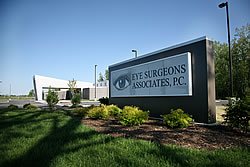The number of people diagnosed with diabetes has exploded over the past decade, due to modern lifestyles and more stringent definitions of what is considered diabetes. High blood sugar from diabetes affects the entire body, including the eyes. If severe enough, eye doctors may see areas of bleeding or swelling in the retinas of the eyes, which is termed diabetic retinopathy.
The purpose of regularly checking the eyes of diabetics is not only to catch eye disease before it becomes severe, but also as a gauge for the family physician or endocrinologist to help determine how well the diabetes is being controlled in general. It is another “tool” in his or her arsenal.
When a person visits our practice, we send a note on the status of the eyes to the regular doctor. If there is minimal or no diabetic retinopathy, it may be reported as stable and the person returns once yearly at a minimum. If we see significant or worsening retinopathy, we alert the family doctor and he or she will work to control blood sugar, blood pressure, and/or serum lipids more strictly. These actions will sometimes reverse or stabilize the retinopathy, and prevent the need for laser surgery or other therapy for the eyes. Retinopathy reflects, to a certain extent, how much effect the diabetes has had on the rest of the body, so better control may help other organ systems as well.
Treatments with lasers and new medications have been a tremendous aid in trying to prevent vision loss. It is distinctly better for the eyes, though, if the need never arises. The same usually holds true for the rest of the body. To reduce your chances of requiring intervention for either eye or general health problems, have your eyes checked at least yearly and make sure your eye doctor is communicating those results to your family doctor.
BIO: Dr. Wymore, with Eye Surgeons Associates, is a board-certified general ophthalmologist. He is a member of the American Academy of Ophthalmology. Dr. Wymore practices at our offices in Rock Island and Silvis, Illinois. For more information, please see our website: www.esaeyecare.com.
The material contained in this article is for informational purposes only and is not intended to be a substitute for professional medical advice, diagnosis, or treatment. Always seek the advice of your physician or other qualified health care provider.




